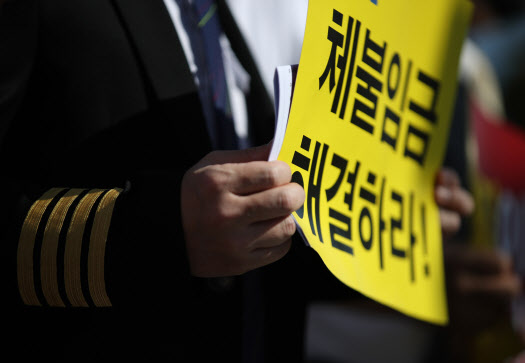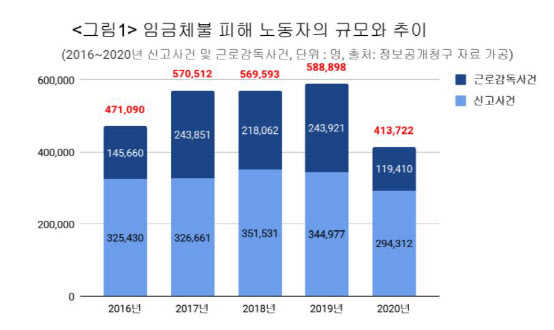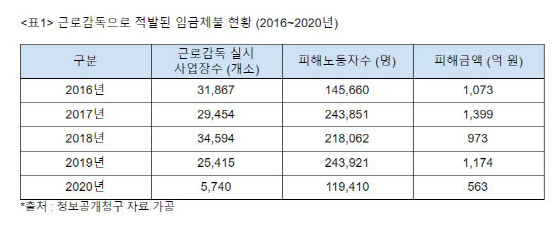The government explained that government subsidies, such as employment maintenance subsidies, played a part. However, some argue that this is because the workplaces that were supervised by the coronavirus last year have been reduced to one-fifth, and reflecting this situation, the unpaid wages are far more severe than the government identified.
|
The government “reduced about 150 billion won in arrears of wages thanks to the employment maintenance subsidy”
According to the Ministry of Employment and Labor on the 13th, the cumulative amount of arrears last year was 1.58 trillion won, and the number of delinquent workers was 294,312. This is an 8.1% decrease from the unpaid amount in 2019 (1.721 trillion won), which reached a record high. The number of delinquent workers also decreased by 14.7% compared to the previous year, which amounted to 34,977. Last year, the liquidation amount was 1.254.9 billion won, an increase of 3.8% from the previous year, and the number of liquidations was 275,918, a 6.9% decrease from the previous year.
As a result, the remaining amount of arrears amounted to 328.1 billion won, a sharp decrease to 35.9% from the previous year. The number of unresolved personnel was also 11,394, down 62.1% from the previous year. The Ministry of Employment and Employment explained that the reason why the remaining amount of arrears decreased drastically was the effect of an increase in the amount of overdue payments by raising the upper limit for small-liquid payments from 4 million won to 10 million won. It also added that the increase in the amount of overdue wage payments resolved under the guidance of the labor inspector from 48% to 52.5% also had an effect.
Overdue pay is a system in which the state pays a certain range of unpaid wages on behalf of the employer when retired workers fail to receive wages due to corporate bankruptcy. In 2019, the amount of delinquent payments increased from 4559 billion won to 5797 billion won last year.
An official from the Ministry of Employment explained, “The decline in wage arrears despite the economic crisis caused by Corona 19 seems to reflect the effects of government subsidies such as employment maintenance subsidies and small business subsidies, along with labor and management efforts to overcome the crisis.”
|
Solidarity of Participation “Reduction of overdue wages is an illusion effect… 80% reduction in labor supervision”
However, there are claims that the explanation that the government subsidies and policies have been effective in reducing wage arrears is incorrect even in Corona 19. The decrease in the amount of overdue wages last year is an illusion, but the scale of overdue payments is maintained. The Participation Solidarity stated in the’Report on Wage Delinquency Status Analysis’, “The most important factor that drastically declined in wage arrears was last year’s labor supervision, which was reduced to about a fifth of the previous year. It is estimated that it has decreased.”
In other words, when the Ministry of Employment and Employment calculated the statistics on wage arrears, the illusion effect occurred by taking only the reporting cases of delinquent workers excluding labor supervision cases. Actually, the scale of damages in delays detected by labor supervision is not small. In 2017, 29,454 workplaces were supervised and 24,3851 workers were found to be in arrears of wages worth 139.9 billion won. In addition, in 2019, 25,415 business sites were supervised, and 24,3,921 people were delinquent in paying a total of 117.4 billion won.
The problem is that last year, the number of workplaces that were supervised due to the coronavirus has dropped sharply to a fifth level compared to the previous year. In fact, there were only 5,740 workplaces that underwent labor supervision last year, but the number of workers who confirmed that wages are overdue was 9,410, which amounted to 56.3 billion won. Labor supervision workplaces are about one-fifth compared to the previous year, but workers who are overdue wages and the amount of damage amounted to half of the previous year. The Participation Solidarity said, “There has been widespread use of caregiving-type labor supervision, or due to Corona 19 over the past year, the problem of overdue wages can be evaluated as very serious in the actual field.”
|
“Employment Maintenance Subsidy, Limits in Reducing Wage Delinquency”
In particular, it is explained that the method of providing employment maintenance subsidies to difficult industries such as the travel industry has limitations in controlling overdue wages. Employment Maintenance Subsidy is a system in which the government provides up to 90% of the amount paid to the Employment Insurance Fund when the employer maintains employment by shortening working hours or paying a leave of absence instead of a reduction in employment despite business difficulties.
The government explains that if the employer applies for the employment maintenance subsidy, the Ministry of Employment and Labor can reject the application for the employment maintenance subsidy if it is confirmed that there is a delay in paying the relevant workplace. An official from the Participation Alliance said, “Even though the employment maintenance subsidy may have a short-term and limited effect on the reduction of wage arrears, it is difficult to see it as a fundamental measure.” “This is because if the subsidies are cut off, the wages of insolvent companies may increase again.”
The Participatory Solidarity argued that in order to reduce the damages of overdue wages, the application of anti-intentional punishment, which essentially exempts the victim from criminal punishment if they do not wish to punish the employer, should be abolished. It also suggested that the delayed interest system, which is applied only to retirement victims, should be expanded to the incumbent, and the effectiveness of it should be strengthened by introducing punishment provisions for non-compliance.
– .




